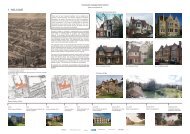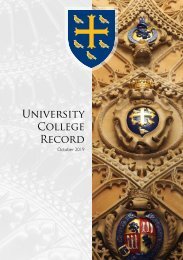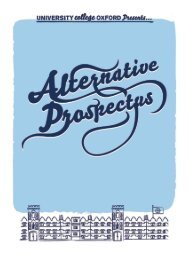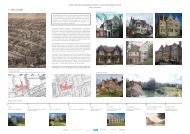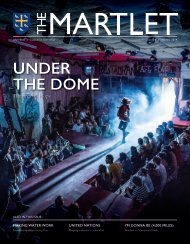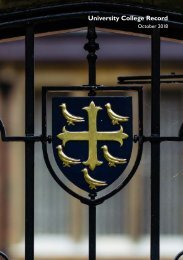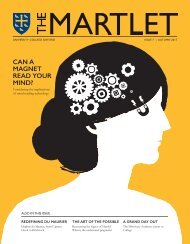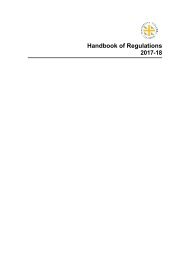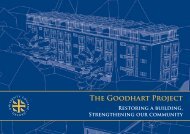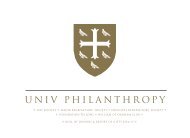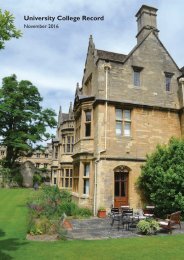You also want an ePaper? Increase the reach of your titles
YUMPU automatically turns print PDFs into web optimized ePapers that Google loves.
1974<br />
ALEX DANCHEV (King James’s College, Huddersfield) died suddenly in August 2016<br />
aged 60. Professor Garry Taylor, Acting Principal and Master at the <strong>Univ</strong>ersity of St.<br />
Andrews, published a tribute to Alex on the website of St. Andrews, from which these<br />
extracts are given:<br />
It is with deep sadness that I have to inform you of the death of our friend and<br />
colleague Alex Danchev, Professor of International Relations.<br />
Alex was an extraordinary Professor of International Relations, who took a cross<br />
disciplinary approach encompassing broad ranging interests including; art, global politics,<br />
war, ethics and military history. His chief interest was in works of the imagination, and in<br />
putting the imagination to work in the service of historical, political and ethical inquiry.<br />
As a teacher he was rated extremely highly; having won the Dearing Award for<br />
Excellence in Learning and Teaching, and a Political Studies Association Award for<br />
Innovation in Teaching.<br />
He was also a committed researcher, who loved discovering a line of enquiry and then<br />
following it no matter where it led. He wrote extensively on art and politics and good and<br />
evil in the modern world, published a prize winning new translation of The Letters of Paul<br />
Cézanne, and authored of a number of internationally acclaimed biographies. His was an<br />
academic life brimming with lives – his 2012 biography of Cezanne was widely praised;<br />
his biography of the philosopher statesman Oliver Franks was on the Observer’s Books<br />
of the Year; his biography of the military writer Basil Liddell Hart was listed for both<br />
the Whitbread Prize for Biography and the Samuel Johnson Prize for Non Fiction; and<br />
his unexpurgated edition of the Alanbrooke Diaries was listed for the W.H. Smith Prize<br />
for Biography. In 2009 he published On Art and War and Terror, a collection of essays on<br />
the most difficult issues of our age and, in particular, the nature of humanity in times of<br />
conflict; followed by his most recent book, On Good and Evil and the Gray Zone – a sequel<br />
published last year.<br />
Alex was born in Bolton, the son of a mining engineer, and brought up in Alloa<br />
and Huddersfield. He was educated at <strong>Univ</strong>ersity College, Oxford; Trinity Hall,<br />
Cambridge; and King’s College London before his academic career began as an officer<br />
in the Royal Army Education Corps in 1979. His journey continued at Keele <strong>Univ</strong>ersity<br />
where he became a Professor in his mid thirties. He then took up a Professorship at the<br />
<strong>Univ</strong>ersity of Nottingham, where he held a chair, before being appointed to the School<br />
of International Relations at St Andrews in 2014.<br />
Alex enjoyed working in St Andrews, where he found an openness to cross<br />
disciplinary enquiry and continued his life’s work of exploring what it means to live well<br />
as a human being. He set us a great example. Colleagues in the school remember a man<br />
of great personal warmth, hugely committed to his students; and who was passionate,<br />
and deeply articulate, about the wide range of topics that interested him. Both in the<br />
school and across the wider university, we will recall his profound commitment to an<br />
interdisciplinary exploration of the power of the artistic imagination to illuminate the<br />
human and social worlds.<br />
1975<br />
ANDREW JOHN LYDIARD (King’s School Chester) died on 22 February <strong>2017</strong>. Ian<br />
Grainger (1974) has kindly written this tribute:<br />
Andrew Lydiard came up to <strong>Univ</strong> from the King’s School Chester in 1975. He was<br />
the only son of George and Beryl Lydiard but had a younger sister Terri to whom he was<br />
always close. The family came from the West Midlands and he was born in Birmingham<br />
but they moved around following the demands of his father’s work at British Steel.<br />
By the time he got to college, certain life-long tastes were already well-formed:<br />
bridge, a distinct list to the political left and above all classical music. He was a violinist<br />
at school but later lapsed to simple listening. He came up as an open scholar to read Law<br />
and his intellectual capacities were immediately obvious: he took firsts in both Mods and<br />
Schools. He was widely and deservedly popular, more for his lively conversation than for<br />
any prowess on pitch or field: sporting endeavour was limited to the occasional foray to<br />
the tennis courts!<br />
Andrew could however talk for England and it was no surprise that after a year doing<br />
an LLM at Harvard, he studied for the English Bar. He was called by Inner Temple and<br />
began pupillage in the Chambers of John Wilmers QC in 1 Harcourt Buildings. He<br />
practised widely in civil matters but increasingly specialised in aviation and insurance<br />
law. In 1992, the set moved to 5 Bell Yard, but unfortunately split in 1998: he was then<br />
offered a place at Brick Court Chambers where he took silk in 2003. Given the field in<br />
which he practised, Andrew’s cases were not always anecdotally riveting but to his credit<br />
he was not one of those lawyers who talked about them. But the talk certainly flowed<br />
in other areas: politics, religion, philosophy, the lot. He had dabbled in academia as a<br />
weekender at Pembroke, Oxford in his early years: he also did voluntary work at various<br />
law centres in London and later for the Bar Pro Bono Unit, a cause dear to his heart.<br />
Together with the late Mark Copping (1975), Andrew sponsored the College’s mooting<br />
cup. He became a civil <strong>Record</strong>er in 2011.<br />
The humanity of the man was best seen in his rich and stable hinterland. In 1983, at<br />
the Catholic Chaplaincy (Andrew himself was already well on the way to being “lapsed”),<br />
he married Mary Adair, a St Hilda’s lawyer. The reception was in the Alington Room.<br />
Theirs was a marriage of enduring stability and love, rendered only firmer by the arrival<br />
of two sons, Robert and Stephen. They lived in Balham and then on Leith Hill, near<br />
Coldharbour in Surrey. Remote and beautiful, the house was a fine location for their<br />
generous hospitality to friends and family.<br />
In January 2016, Andrew was found to have a brain tumour and while fully conscious<br />
underwent lengthy surgery, chatting away to the surgeon in the process, as later explained<br />
in The Guardian. Sadly, he did not last as long as the doctors had hoped but the time that<br />
remained was predictably full. He and Mary helped friends to organise a concert at Leith<br />
Hill House in September and then spent a week in Rome in October. Andrew went<br />
rapidly downhill in January and died peacefully at home on 22 February. At the moving<br />
and well-attended memorial in the local church in April, there was a splendid address<br />
from Paul Dean (Classics, 1976 and a Chambers colleague) and beautiful performances<br />
of Bach and Mahler. It was a lovely occasion that perfectly fitted a good and gentle man.<br />
90<br />
91




